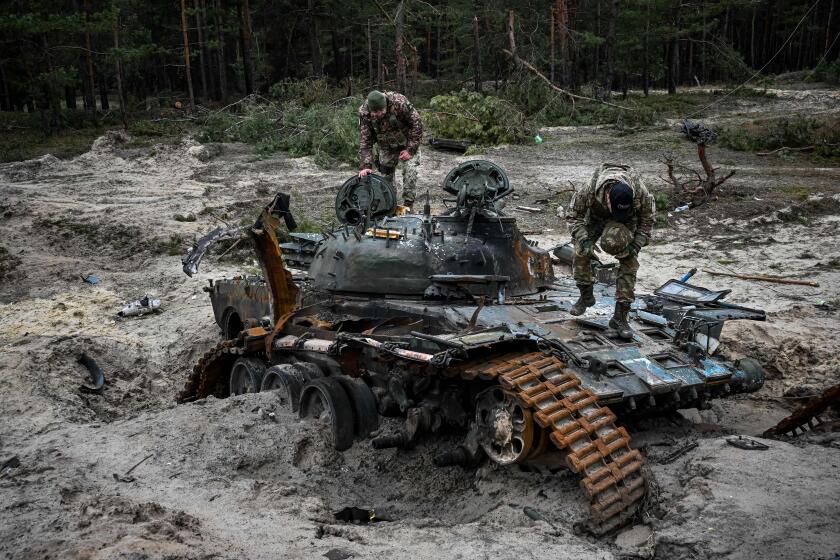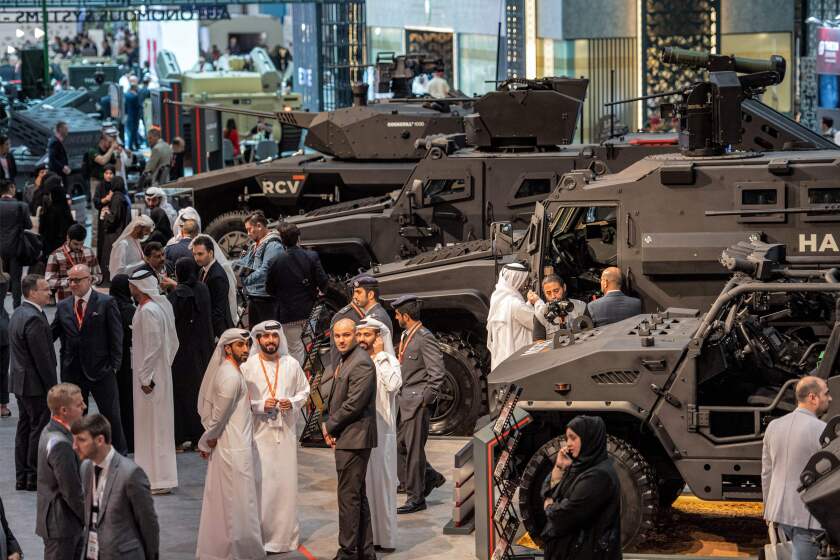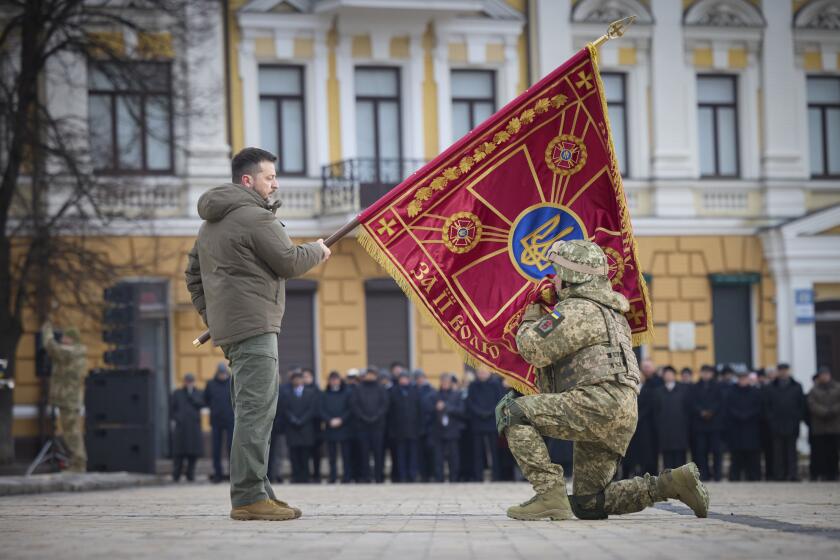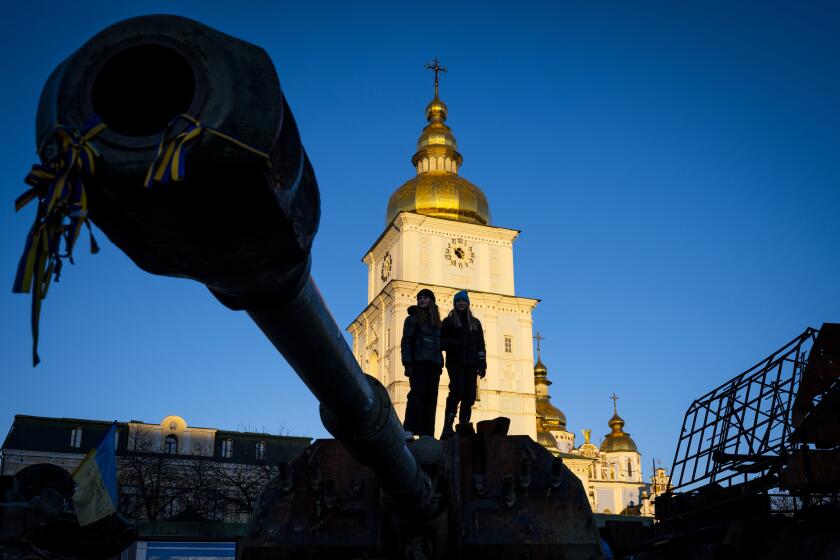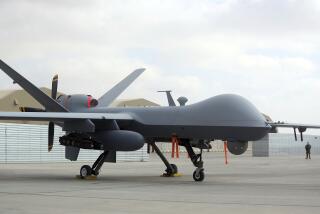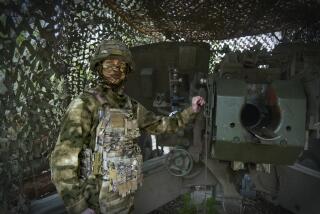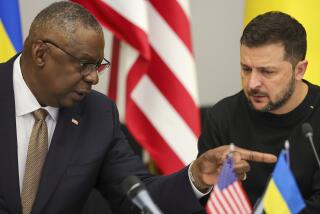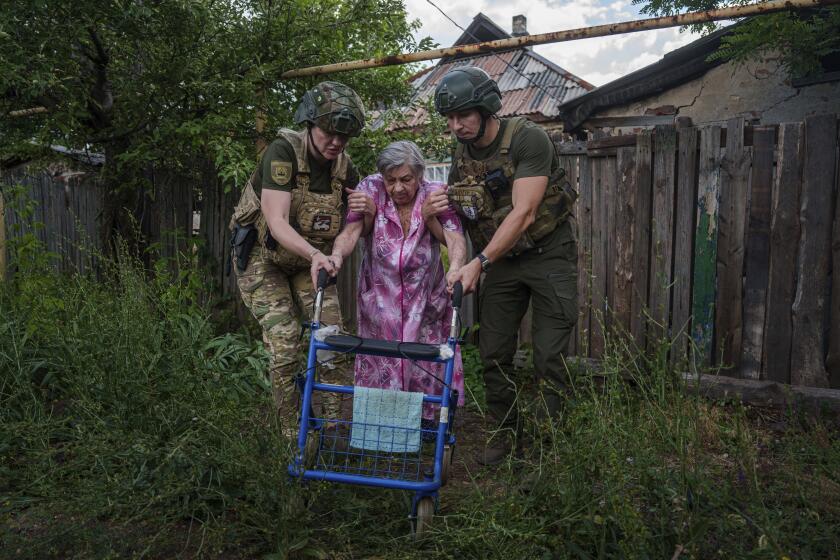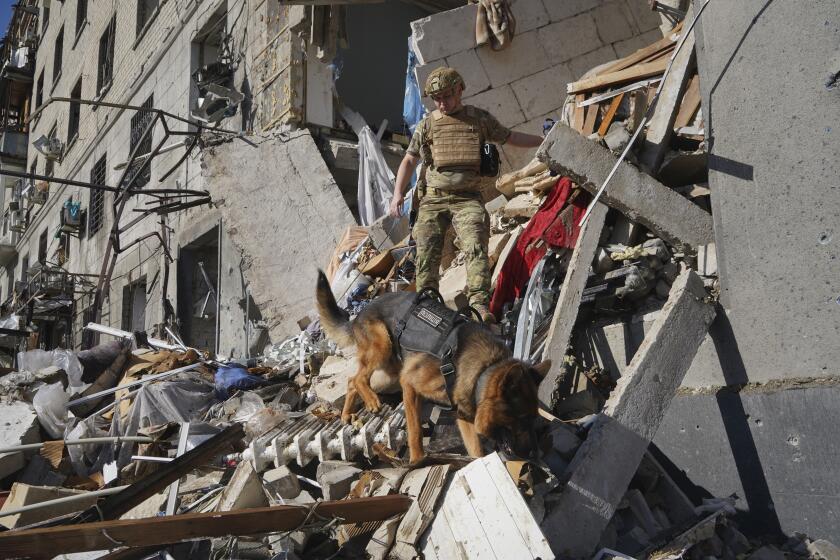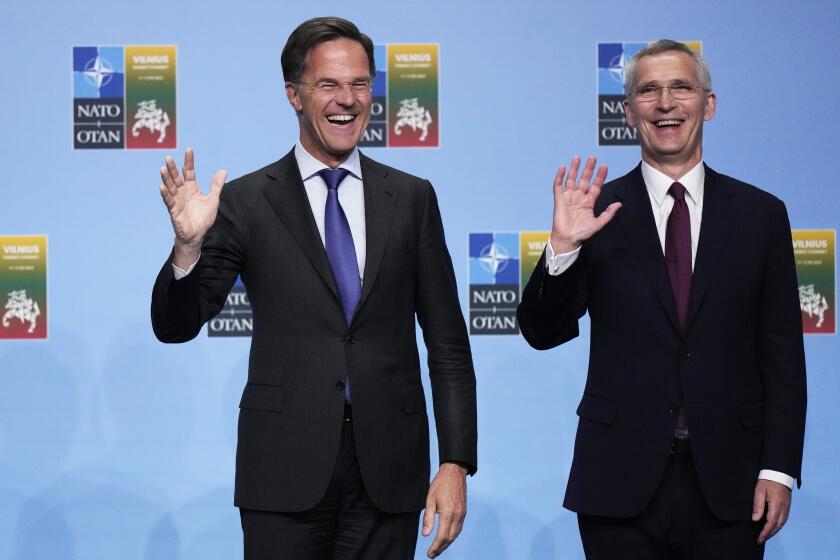Russian fighter jet hit U.S. drone over Black Sea, military officials say
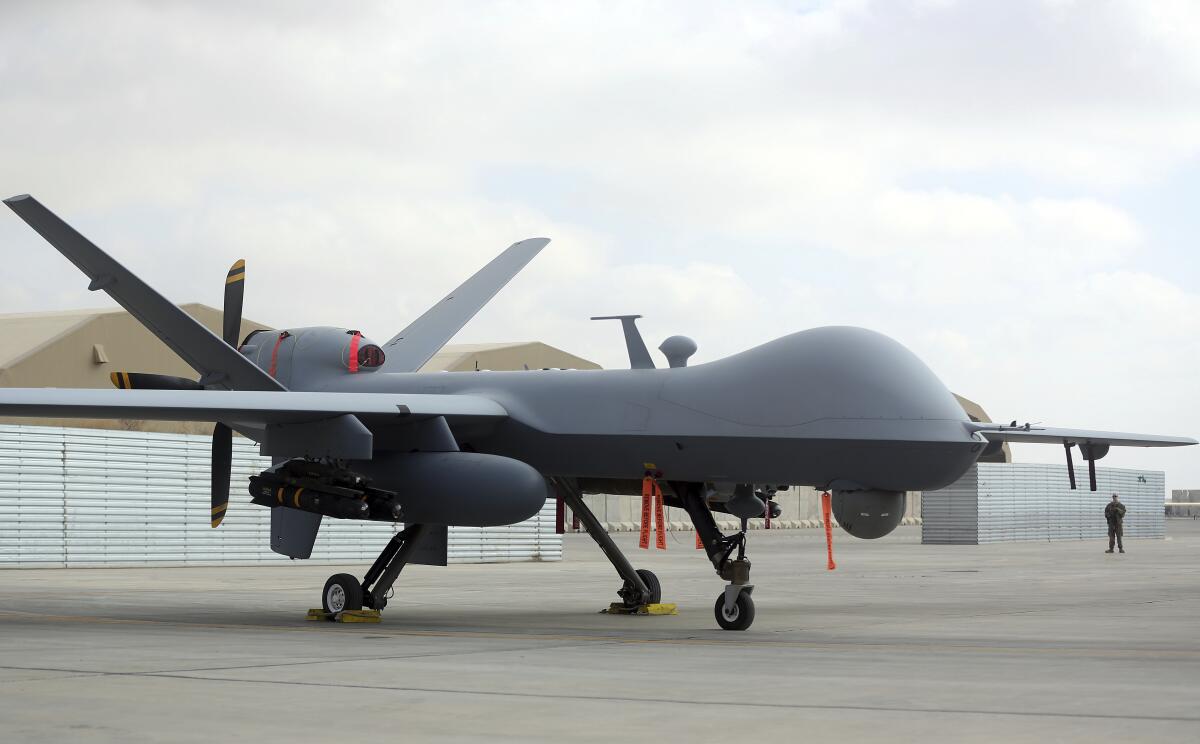
A Russian fighter jet struck the propeller of a U.S. surveillance drone over the Black Sea on Tuesday in a “brazen violation of international law,” causing American forces to bring down the unmanned aerial vehicle, the U.S. said.
But Russia insisted its warplanes didn’t hit the MQ-9 Reaper drone. Instead, it said the drone maneuvered sharply and crashed into the water after an encounter with Russian fighter jets that had been scrambled to intercept it near Russian-occupied Crimea.
The incident, which added to Russia-U.S. tensions over Moscow’s war in Ukraine, appeared to be the first time since the height of the Cold War that a U.S. aircraft was brought down after an encounter with a Russian warplane.
President Biden was briefed on the incident by national security advisor Jake Sullivan, according to White House national security spokesman John F. Kirby. He added that State Department officials would be speaking directly with their Russian counterparts and “expressing our concerns over this unsafe and unprofessional intercept.”
Ned Price, a spokesman for the State Department, called it a “brazen violation of international law.” He said the U.S. summoned the Russian ambassador to lodge a protest, and the U.S. ambassador to Russia, Lynne Tracy, has made similar representations in Moscow.
The U.S. European Command said two Russian Su-27 fighter jets intercepted the drone while it was operating in international airspace. It said one of the Russian fighters struck the propeller of the MQ-9, causing U.S. forces to bring it down in international waters.
The Ukrainian military’s surrender hotline, dubbed ‘I Want to Live,’ is enticing some Russian soldiers to quit the battlefield as the war drags on.
Before that, the Su-27s dumped fuel on the MQ-9 and flew in front of it several times in “a reckless, environmentally unsound and unprofessional manner,” the U.S. European Command said in a statement from Stuttgart, Germany.
“This incident demonstrates a lack of competence in addition to being unsafe and unprofessional,” it added.
Air Force Gen. James B. Hecker, commander of U.S. Air Forces Europe and Air Forces Africa, said the drone was “conducting routine operations in international airspace when it was intercepted and hit by a Russian aircraft, resulting in a crash and complete loss of the MQ-9.” He added that “in fact, this unsafe and unprofessional act by the Russians nearly caused both aircraft to crash.”
Pentagon spokesman Air Force Brig. Gen. Pat Ryder said the incident occurred at 7:03 a.m. Central European Time over international waters, and well clear of Ukraine, after the Russian jets had flown in the vicinity of the drone for 30 to 40 minutes. There did not appear to be any communications between the aircraft before the collision, Ryder added.
The MQ-9 is capable of carrying munitions, but Ryder would not say whether it was armed. The U.S. had not recovered the crashed drone, U.S. Air Forces Europe said in a statement, and neither had Russia, Ryder said.
He said it appeared the Russian aircraft also was damaged in the collision, but the U.S. has confirmed that it did land, although Ryder would not say where.
The war in Ukraine has jacked the global arms trade, fueling a new appetite for materiel not just in Moscow and Kyiv but also around the world.
Russia’s Defense Ministry said the U.S. drone was flying over the Black Sea near Crimea and intruded in an area that was declared off limits by Russia as part of what it calls its “special military operation” in Ukraine, causing the military to scramble fighters to intercept it.
“As a result of a sharp maneuver, the MQ-9 drone went into unguided flight with a loss of altitude and crashed into the water,” it said. “The Russian fighters didn’t use their weapons, didn’t come into contact with the unmanned aerial vehicle, and they safely returned to their base.”
The Russian ambassador to Washington, Anatoly Antonov, described the U.S. drone flight as a “provocation” and argued that there was no reason for American military aircraft and warships to be near Russia’s borders.
Speaking after meeting with Karen Donfried, the U.S. assistant secretary of State for European affairs, Antonov insisted that the Russian warplanes didn’t hit the American drone or fire their weapons. He added that Moscow wants “pragmatic” ties with Washington, adding that “we don’t want any confrontation between the U.S. and Russia.”
Moscow has repeatedly voiced concern about U.S. intelligence flights close to the Crimean peninsula, which Russia seized from Ukraine in 2014 and illegally annexed. The Kremlin has charged that by providing weapons to Ukraine and sharing intelligence information with Kyiv, the U.S. and its allies have in effect become engaged in the conflict.
Kirby emphasized that the incident wouldn’t deter the U.S. from continuing its missions in the area.
Across the country, Ukrainians looked back on a year of war with both sorrow and pride as their president vowed to push for victory over Russia.
“If the message is that they want to deter or dissuade us from flying, and operating in international airspace, over the Black Sea, then that message will fail,” Kirby said. “We’re going to continue to fly and operate in international airspace over international waters. The Black Sea belongs to no one nation.”
The U.S. European Command said the incident followed a pattern of dangerous actions by Russian pilots while interacting with U.S. and allied aircraft over international airspace, including over the Black Sea.
“These aggressive actions by Russian aircrew are dangerous and could lead to miscalculation and unintended escalation,” it said.
Gen. David Berger, commandant of the Marine Corps, said this type of collision is his greatest concern, both in that part of Europe as well as in the Pacific.
“Probably my biggest worry both there and in the Pacific is an aggressive Russia or China pilot or vessel captain, or something gets too close, doesn’t realize where they are, and causes a collision,” Berger said Tuesday.
In Ukraine, a Russian missile struck an apartment building Tuesday in the eastern city of Kramatorsk, killing at least one person and wounding nine others in one of the major urban areas in the Donetsk region.
Ukrainian President Volodymyr Zelensky posted a video showing gaping holes in the facade of the low-rise building, which bore the brunt of the strike that damaged nine apartment blocks, a kindergarten, a bank branch and two cars, said regional Gov. Pavlo Kyrylenko.
War wounds and traumatic captivity, cherry liqueur and air-raid alerts: Weathering the year-old Russian invasion
Russian President Vladimir Putin, speaking with workers at a helicopter factory in southern Siberia, again cast the conflict in Ukraine as an existential one for Russia.
“For us, it’s not a geopolitical task,” Putin said, “it’s the task of survival of Russian statehood and the creation of conditions for the future development of our country.”
Russia had welcomed a Chinese peace proposal, but Kremlin spokesman Dmitry Peskov said Kyiv’s refusal to talk leaves Moscow with only military options.
“We must achieve our goals,” Peskov told reporters. “Given the current stance of the Kyiv regime, now it’s only possible by military means.”
The Russian onslaught has focused on the devastated eastern city of Bakhmut, where Kyiv’s troops have been fending off attacks for seven months and which has become a symbol of resistance.
Zelensky discussed Bakhmut with the military brass and they were unanimous in their determination to face down the Russian onslaught, according to the presidential office.
“The defensive operation in [Bakhmut] is of paramount strategic importance to deterring the enemy. It is key for the stability of the defense of the entire front line,” said Valerii Zaluzhnyi, the commander in chief of Ukraine’s armed forces.
Lolita C. Baldor, Tara Copp, Zeke Miller, Aamer Madhani and Matthew Lee in Washington and Lorne Cook in Brussels contributed to this report.
More to Read
Start your day right
Sign up for Essential California for news, features and recommendations from the L.A. Times and beyond in your inbox six days a week.
You may occasionally receive promotional content from the Los Angeles Times.
